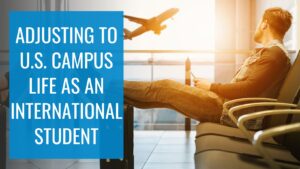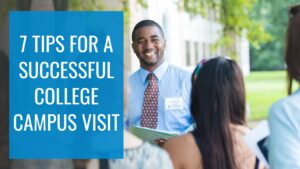In learning more about colleges and universities, visiting can be an important component in the decision-making process to apply and/or attend. Visitors, whether in-person or virtual, have the chance to determine for themselves if the institution is a good fit academically, socially, and personally. Asking the appropriate questions can narrow down options and provide a solid sense of confidence in the college admissions process.

There isn’t much time when visiting colleges and universities, so questions should be targeted to the right people at the right time to make the most of the experience.
College admissions representatives, financial aid representatives, current students, faculty, alumni, and athletics coaches will be the possible available sources for questions. Campus visits usually consist of a campus tour and a visit to the admissions office, where there may be a presentation on the school and information on the admissions process. Typically, visitors will meet an admissions representative or current student. Beyond this and for individual meetings, visitors may need to schedule in advance, so a focused approach is necessary.
Ask questions that are not easily found online, and try not to repeat information provided in the admissions presentation. An overwhelming amount of information is available online and through booklets, videos, and more. With all of these resources available, it may seem as though no additional information is needed while visiting. However, specific interests and concerns may not be addressed in these more general formats and the experiences of current students may vary widely.
Sticking to the subjects that matter most will help reveal fit and comfort level moving forward. Compare the findings across schools. Important, too, is the timing of questions. If you are meeting individually with an admissions representative, current student, and/or a faculty member there will be plenty of time to ask questions, but if not, being selective is paramount. The conclusion of an admissions presentation or campus tour will present a few opportunities, so direct your questions at the appropriate time. If the most important questions are not addressed or there is not enough time, schedule a meeting with someone who can fill in the gaps, if available.
Questions can be divided into broad categories: admissions, academics, campus, students, and career. Each broad category can be addressed by different people on campus. Below are several suggested questions to ask during a college visit and whom to ask.
Admissions & Financial Aid Questions for Admissions Representatives
· What are the graduation rates? What are some reasons students do not graduate in four years? Are there any particular reasons students leave or transfer?
· Are admissions rates different for different majors?
· Does demonstrated interest make a difference in the admissions process?
· Is the school test optional?
· How important is legacy?
· Are interviews a factor in the admissions process? Who conducts them and where or how?
· What is different about this school?
· Can I speak with a financial aid officer? What kind of scholarships and/or merit awards are available, if any? Are there athletic scholarships? What is the average financial aid package?
· Is the school able to meet financial need? What is the average amount of loan debt for graduates?
· Do you have need-blind admissions?
Academic Questions for Admissions Representatives, Current Students, or Faculty
· What are the most popular majors? Best reputations? When do students need to declare? Is it a popular choice to double-major or major and minor?
· Is it easy to switch majors after declaring?
· Is the school on a quarter, trimester, or semester system?
· How many classes do students typically take each semester/trimester/quarter?
· What is the typical teaching style (lecture, seminar, teaching assistant versus professor, etc.)?
· How many students are in a classroom on average?
· What are some favorite classes and why?
· How much time is normally spent on homework? Are there any group projects or presentations required?
· What are the study-abroad options? Is studying abroad popular?
· Are there research opportunities for undergraduates?
· Is there an honors college or honors program?
· What is academic advising like? Are professors also advisors? Are there tutoring programs or support?
· Are capstone projects required for seniors?
· Are professors accessible? Do they have office hours?
· Are there any particular popular study spots for students?
Campus Questions for Tour Guides or Current Students
· What is different or special about this campus in particular?
· Is campus housing available? What kinds of choices are there? What percentage of students live on campus and is it required? Do you get to choose a roommate or are they assigned? What are the dorms like (students per room, bathrooms, showers, kitchens, laundry, lounging, etc.)? Are dorms separated by any criteria (year, interests, culture, etc.)?
· What do the meal plan options look like? Is the food good?
· Are health resources available?
· Are the disability services on campus helpful and what kinds of resources are offered?
· Can students have cars on campus?
· What percentage of students belong to a sorority or fraternity?
· Are there many parties on campus? How prevalent are drugs and alcohol on campus?
· What are some popular hangout spots on campus?
· Are there workout facilities for students who are not athletes?
· What kinds of facilities, in general, are available to students (libraries, labs, theaters, etc.)?
· How do most students get around on campus (bike, car, scooter, walk, etc.)?
· Is there campus transportation?
· Is public transportation accessible? Is there transportation to airports?
Student Life Questions for Current Students
· Are you happy here? Why did you choose this school in particular?
· What is something you do not like about this school or what would you improve?
· Do you feel safe on campus? In the surrounding community?
· What is a typical day like?
· Do you go off-campus often? Do many students live off-campus?
· What kinds of activities are available? What student organizations are popular?
· What do you do for fun?
· Are sporting events well attended? What division of athletics is the school? Are sports a big part of student life and campus culture?
· What is school spirit like?
· Are people friendly? What is the social scene like?
· Is the student population diverse? Are there many international students?
· Is this an active campus for social justice? Have there been any recent protests on campus? If so, what was the focus?
Career & Post-Graduate Questions for Admissions Representatives or Alumni
· What kind of career support and guidance is there for undergraduates?
· Are alumni actively involved in the school? Who are some notable alumni?
· Is there job-placement assistance? Do recruiters come to campus?
· Are internships on campus available? Off-campus?
· What kinds of opportunities exist on campus to build a profile prior to graduation?
· Are service-learning opportunities available?
· Are summer jobs or work during the school year available?
· Are there work-study options?
· Is there a co-op program?
· Do students get involved in the surrounding community much?
· What percentage of students go on to graduate school and/or earn advanced degrees?
In Conclusion
By the end of a campus visit, having asked enough of the right questions should provide a clearer sense of belonging and define the level of interest in attending. Finding out what it’s really like academically, socially, and personally will help determine fit. Remember to ask questions from a variety of the available sources. Good conversations will lead to better and stronger feelings about college options. If you’re looking for help finding the right college for you, why not contact us?

All of our blog posts are written by Former College Admission Officers who serve as members of our admission consultant team.



